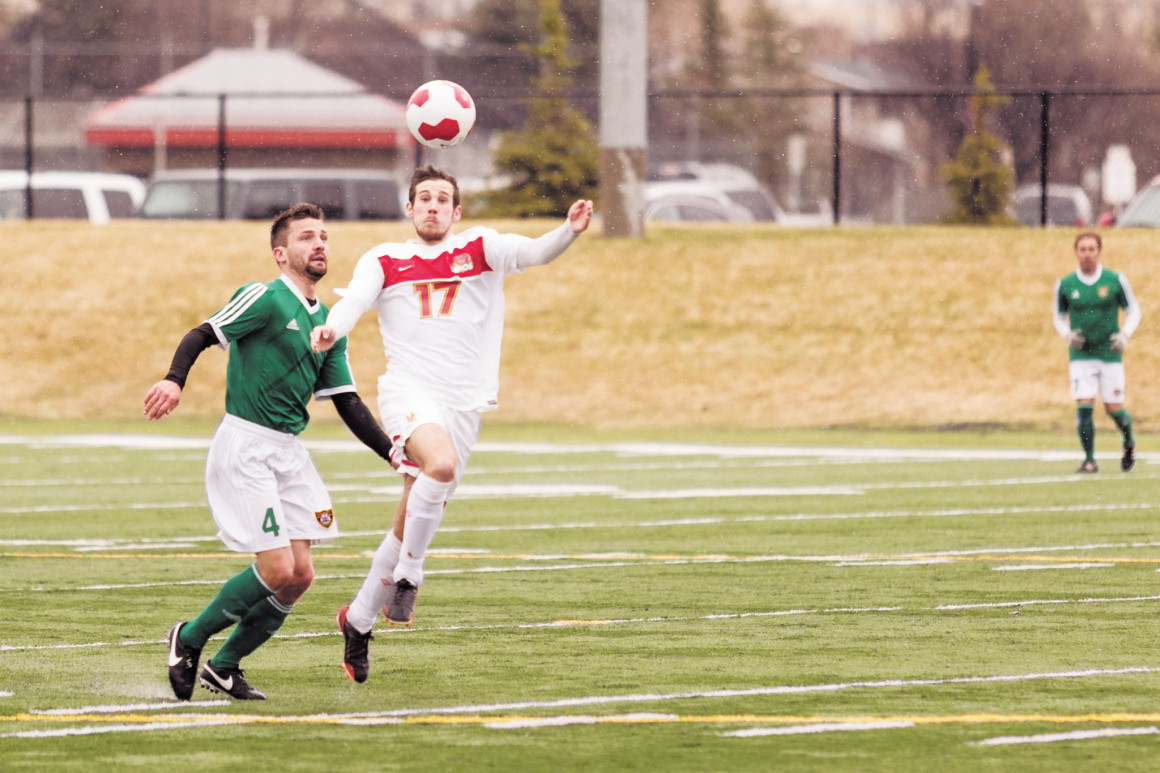
Dinos soccer teams to lose field after the end of 2016 season
By Emilie Medland-Marchen, February 9 2016 —
After more than a decade of playing on Field 8, the Dinos soccer teams are slated to lose their designated practice and competition pitch. The Dinos will lose their field following the conclusion of the 2016 season, after which the space will be used for the development of West Campus. Starting in 2017, the teams will move to a multi-use artificial turf that the soccer and field hockey programs will share.
The Dinos athletics department has been negotiating with university administration over the proposed West Campus development since 2010. Three Dinos fields on campus — Fields 7, 8 and 9 — will be removed in order to build a mixed residential and retail area.
Brendan O’Connell is the head coach of the Dinos men’s soccer team. O’Connell led his team to a successful first place finish in the Prairie Division of the Canada West this season. He said he’s been told little about the impending move.
“All I know is that we’ve got the pitch for another season,” O’Connell said. “We’re pleased about that. To be honest, that’s all I know. I’m not involved in whatever the negotiations are with regards to the pitch. I’m not involved with what’s going there, where it’s going or where we are going.”
The changes come after an exceptional 2015 season for the Dinos soccer program — one that saw both the men’s and women’s teams rank among the best in the country.
“The boys beat U of A twice — that was the first time in 47 years that’s been done,” O’Connell said. “Dominic Russo made the All-Canadian team. He broke records.”
The Dinos women’s soccer team found success as well, posting an 8–3–3 record and making it all the way to the CIS Championships.
Despite this success, O’Connell said communication has been limited in regards to his inclusion in the decision-making process.
“Where we’re going to play — I don’t know what the plans are for the university. As a coach, I’ve been kept in the dark. No one’s told me anything.”
U of C vice-president facilities Bart Becker said the Dinos athletics department was consulted before designating the land for commercial use.
“Through the consultation process, impacts to all university operations were identified so that all parties could prepare a contingency plan,” Becker said.
While the Dinos originally believed they would lose Field 8 as soon as next season, the university has since postponed development until the end of the 2016 campaign. Per Becker, the Dinos program is set to receive $1-million of committed funding to develop a new artificial turf that would host both field hockey and soccer games and practices.
“This will become a multi-sport field with lights, ensuring that Dinos field hockey and soccer have a field to play on,” Becker said in a statement from the university.
However, the transition from Field 8’s real grass to artificial turf could be problematic. Turf is known to have a notable effect on both the game and the players.
Two-time Olympic gold medalist Sydney Leroux has been vocal about the subject in the past. Leroux suffered numerous injuries while playing on artificial turf with Seattle Reign FC of the National Women’s Soccer League, including cuts, bruises and extensive “turf burn.” In 2014, she spoke to ESPN about the effect of playing on artificial turf as opposed to real grass.
“There is a huge difference,” Leroux told ESPN. “I learned while playing on the turf in Boston, there are certain tackles I am just not going to go into. The sport we play is physical, but when going into a tackle, you are not supposed to be thinking, ‘Crap, this is going to hurt, and [it’s] probably not worth it.’ Turf does that to you.”
In addition to the increased risk of injury, artificial turf can also affect gameplay.
“The ball bounces differently — faster,” Leroux said. “You can’t just play a ball over the top and know it will die and fall at a player’s feet. The way you strike the ball is different. You can’t chip a ball the same on turf and you can’t get under the ball the same way. I feel like it is a completely different game.”
Dinos assistant athletic director Ben Matchett said the impending move reflects the reality of the program’s capabilities.
“It’s not an ideal situation,” Matchett said. “We would like to be in a situation where we have outstanding facilities that are available for everyone to be able to do as much programming as they possibly can for our teams. We’re just in a reality where that’s not ideal.”
